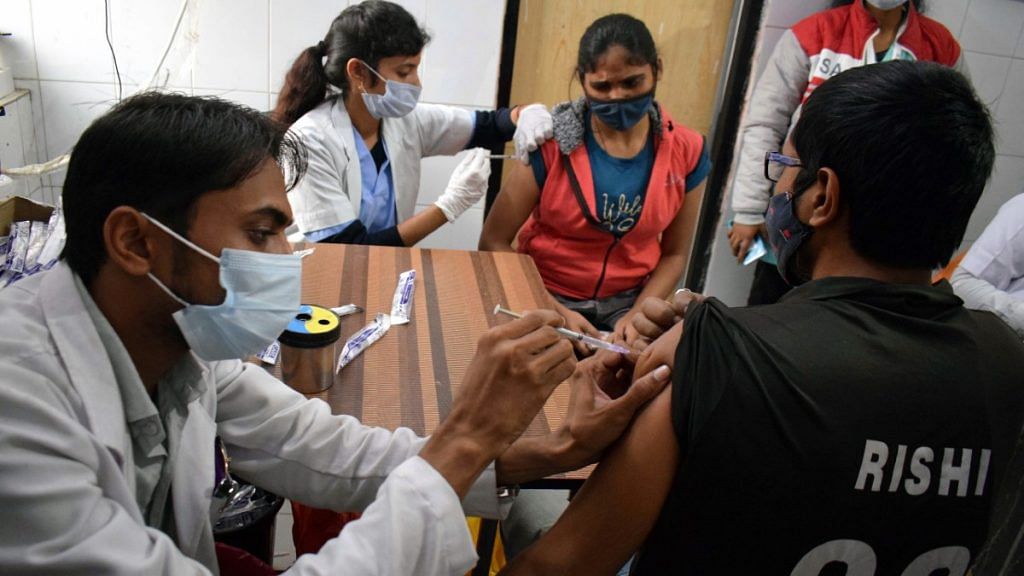New Delhi: Covid-19 vaccines likely saved more than 19.8 million lives within a year of their rollout, slashing the potential global toll of the pandemic by 63 per cent, according to a study published in The Lancet Infectious Diseases medical journal Friday.
The study, said to be the first to estimate the impact of Covid-19 vaccinations on a global scale, was conducted by researchers from the UK’s Imperial College London using mathematical modelling.
The researchers based their study on an overall figure of 31.4 million probable Covid deaths across 185 countries between 8 December, 2020 and 8 December, 2021.
The study further said that 5,99,300 lives could have been saved if the World Health Organisation’s (WHO’s) target of having 40 per cent of the world’s population vaccinated against Covid by the end of 2021, had been met.
“Of the almost 20 million deaths estimated to have been prevented in the first year after vaccines were introduced, almost 7.5 million deaths were prevented in countries covered by the Covid-19 Vaccine Access initiative (COVAX),” Oliver Watson, a PhD student at the Imperial College London and lead author of the study, said in a statement issued Friday.
COVAX is a global health initiative co-led by the WHO and other global health bodies, with the aim of ensuring equitable access to Covid vaccines worldwide.
“This initiative was set up because it was clear in the initial stages of the pandemic that global vaccine equity would be the only way out of the pandemic. Our findings show that millions of lives have likely been saved by making vaccines available to people everywhere, regardless of their wealth,” Watson further said in his statement.
Asserting that “more could have been done”, the lead author of the study said that if targets set by the WHO had been achieved, “roughly 1 in 5 of the estimated lives lost due to Covid-19 in low-income countries could have been prevented”.
According to the study, high and upper-middle-income countries accounted for most of the deaths averted due to Covid vaccines, highlighting inequalities in terms of access to jabs around the world.
Moreover, the study said, vaccines were able to prevent the most number of Covid deaths in high-income countries where the rollout of jabs was early and widespread. For every 10,000 people, Covid vaccines prevented 66 deaths in high-income countries compared to approximately three deaths in low-income countries.
While several previous studies have tried to estimate the impact of vaccination, the UK researchers said that most of them focussed on individual countries, states, or cities.
Also Read: Does long Covid affect kids? How? What ‘largest coronavirus study on kids’ in Lancet says
More deaths could’ve been prevented
According to the study, around 79 per cent of the averted Covid deaths worldwide were prevented due to direct protection against severe symptoms provided by vaccination, leading to lower mortality rates. The remaining were due to indirect protection due to individuals living in vaccinated environments and reduced burden on healthcare systems, thereby improving access to medical care for those most in need.
For the 83 countries included in the analysis that are covered by the COVAX commitment to access to affordable vaccines, an estimated 7.4 million deaths were averted out of a potential 19.8 million.
However, failure to meet COVAX’s initial target of fully vaccinating 20 per cent of the population in some countries is estimated to have resulted in an additional 1,56,900 deaths, according to the study.
Though this figure represents a small proportion of the total global deaths, these preventable deaths were concentrated in 31 African nations, where 1,32,700 deaths could have been averted if the target had been met, it further said.
Under-reporting of deaths
To measure the impact of Covid vaccination programmes across the world, the researchers came up with two estimates of the number of Covid deaths averted by vaccines — 14.4 million or 79 per cent (based on official figures reported by countries), and 19.8 million or 63 per cent (if estimated ‘excess deaths’ are taken into account).
According to the researchers, if excess Covid deaths were used as “an estimate of the true extent of the pandemic”, 63 per cent deaths were averted globally due to direct protection against severe symptoms provided by vaccination, leading to lower mortality rates.
In order to account for the under-reporting of deaths in countries, researchers carried out a separate analysis based on the number of estimated excess deaths between 8 December 2020 and 8 December 2021.
Where official data was not available, the team used estimates of all-cause excess mortality (difference between recorded and expected number of deaths in non-pandemic years).
These analyses were then compared with an alternative hypothetical scenario in which no vaccines would have been administered anywhere around the globe.
“Quantifying the impact that vaccination has made globally is challenging because access to vaccines varies between countries, as does our understanding of which Covid-19 variants have been circulating, with very limited genetic sequence data available for many countries,” said Gregory Barnsley, a research assistant at the Imperial College London and co-first author of the study, in a statement.
“It is also not possible to directly measure how many deaths would have occurred without vaccinations. Mathematical modelling offers a useful tool for assessing alternative scenarios, which we can’t directly observe in real life,” Barnsley added.
(Edited by Amrtansh Arora)
Also Read: Typhoid bacteria increasingly resistant to key drugs, says Lancet study, flags ‘India risk’
